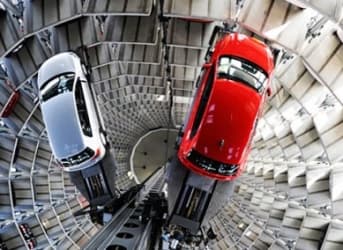The phrase “Too Big To Fail” came about during the Financial Crisis of 2008 to describe banks bailed out by the U.S. government after they were deemed systematically important during a crisis. While the recession of 2008 has long since ended, a new kind of Too Big To Fail maybe emerging.
Volkswagen disclosed recently that some of its diesel cars cheated on emissions tests using a sophisticated piece of software to artificially lower emissions. That admission of environmental guilt has created a firestorm that has already brought down VW’s CEO and caused massive damage to its reputation. Yet for all the talk about VW’s actions and the duplicity involved, there has been little evidence that the firm will face a financial cost that could imperil its future. Unlike BP after the Deepwater Horizon spill, Volkswagen has not been hit with the immediate torrent of costs that BP was. As a result, VW’s stock is only about 25 percent below where it was before news of the scandal hit. For an event of this magnitude, a 25 percent fall in price is not bad. Related: Forget Vegas, Nevada Is Now About Reno And Lithium
By some estimates, VW may have to pay the U.S. about $18 billion in fines, whereas BP, by contrast, ended up facing costs in excess of $50 billion. Volkswagen is being helped by two factors: First, there is far less of a tradition of class action lawsuits in Europe (where most VW diesels are sold) meaning the firm will face significantly lower penalties from courts. And second, VW in particular and diesels in general are critical to European life today.
Diesel fuel engines generally get better mileage but have greater levels of air contaminants compared with gasoline engines. In Europe, where fuel prices can be $7 a gallon for gas or more, fuel economy is often regarded as more important than pollutant levels. As a result, the number of diesel cars on the road has grown markedly in the last 25 years. In Western Europe, the share of diesel cars on the road has grown from just under 14 percent in 1990 to more than 53 percent for the full year 2014. In countries like France and Spain, nearly two-thirds of cars are diesels made by a variety of companies from VW to Renault. Related: Iran May Not Be That Attractive To Oil Industry After All
Diesels are so important to the lifestyle of so many Europeans that in response to a suggestion from a member of the French Green Party, Segolene Royal, the French environment and energy minister was recently quoted saying “Ban Diesels? You can’t be serious… we can’t treat problems of this gravity with ideological slogans at the expense of French interests.” As long as Europe’s vast market for diesels remains secure, VW is going to remain an entrenched and necessary part of the economic fabric of life. Related: Next Few Weeks Will Reveal Full Extent Of Oil Industry Suffering
In addition, Volkswagen is truly too big to fail in industrial Germany. Indeed, as a recent Businessweek story revealed, VW has long been such an important factor in the German economy that the company received special attention and treatment from the government. The German state where Volkswagen is headquartered, Lower Saxony, owns 20 percent of the overall VW company. It is inconceivable then that the German government would penalize the firm so heavily as to permanently cripple it given that doing so would hurt the State’s own economic interests.
None of this means that VW’s recovery will be easy, fast, or swift. Lawsuits will likely drag on for years and the German government may end up taking even firmer control over VW when all is said and done. But given Germany’s economic importance in Europe and the global economy, and given VW’s importance to Germany, the company as a whole is not going anywhere. And for that matter, nor are the increasingly ubiquitous European “clean” diesels.
By Michael McDonald of Oilprice.com
ADVERTISEMENT
More Top Reads From Oilprice.com:
- How Long Can OPEC Hold Out?
- Shell’s Scrapped Oil Sands Project Highlights Major Issue For Canada
- Pain For Oilfield Services Will Continue Even If Oil Prices Rebound


















